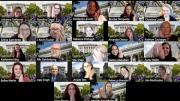Had this been a typical year, College seniors would have walked back to their Houses to receive their diplomas following Thursday morning’s Commencement exercises in Tercentenary Theatre, while newly minted doctor’s and master’s degree-holders would have returned to the graduate and professional school campuses to receive theirs. But this academic year, as President Lawrence S. Bacow noted in his Tuesday Baccalaureate address, was anything but typical, and the Commencement week exercises were once again virtual. Thursday morning’s University-wide Commencement event, Honoring the Harvard Class of 2021, included the traditional welcome and conferral of degrees (including honorary degrees, after a pause in 2020), as well as student orations and a principal address to all the graduates by Ruth J. Simmons, Ph.D. ’73, LL.D. ’02—president emerita of Smith College and Brown University, now president of Prairie View A&M.
Bracketing the main event were class day and graduation ceremonies at Harvard’s graduate and professional schools, during which distinguished speakers shared words of wisdom with the graduating classes. Harvard Business School’s Class Day ceremony, held early Thursday morning, included an address by Walmart CEO Doug McMillon. In the afternoon, for the Graduate School of Design, Jia Tolentino, an editor and New Yorker staff writer, delivered the Class Day speech. The Harvard T. H. Chan School of Public Health’s virtual convocation ceremony featured a keynote by World Health Organization Director-General Tedros Adhanom Ghebreyesus. And graduates of the medical and dental schools heard from two speakers: Castle professor of medicine and professor of immunology Dan Barouch, M.D. ’99 (who helped develop the Johnson & Johnson vaccine against SARS CoV-2), delivered the graduation address, and Valerie Montgomery Rice, M.D. ’87, the president and dean of Morehouse School of Medicine, gave the Class Day keynote speech a few hours later.
Reports on a sampling of Thursday’s graduate and professional school speeches follow.
“Leaders Shape Culture with Everything They Do and Say”: Harvard Business School Class Day
Walmart Inc. CEO Doug McMillon grew up in Arkansas, in a town where Walmart was his mother’s primary destination for goods: “It changed the standard of living for our family.” By coincidence, the family moved to the small town of Bentonville, home of Walmart’s headquarters, and McMillon, at 17—pressed to save money for college—took a job for $6.50 an hour at the company’s distribution center. “It was hot and it was hard work, but people were happy. We stayed busy, but there was a lot of laughter. On breaks and in those trailers, people expressed their excitement about Walmart. The culture and tenure of people in those buildings surprised me. The way they talked about Sam Walton surprised me. From him, to the people working in those hot trailers, strangely, it felt like team. What I found is: culture matters, and leaders shape culture with everything they do and say.”
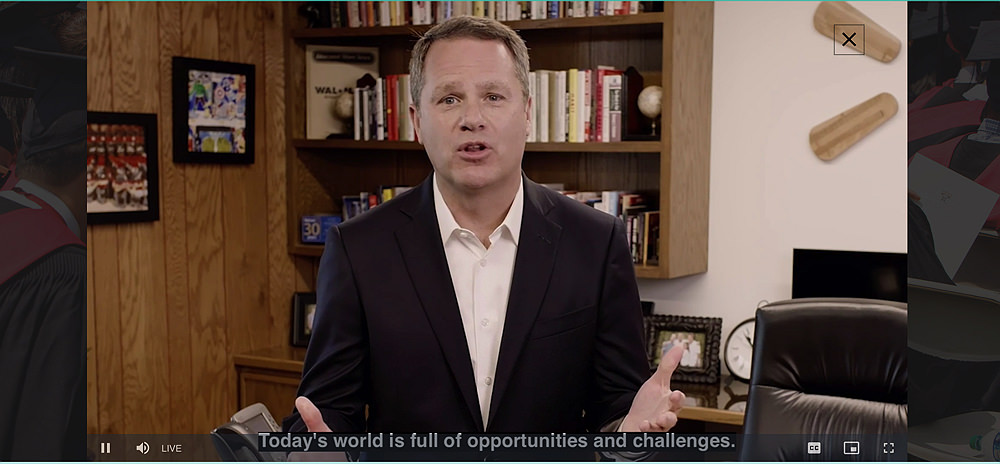
Doug McMillon
Screenshot by Harvard Magazine
Today, McMillon oversees more than 2.3 million employees and worldwide stores generating aggregate revenues of nearly $560 billion a year. From a business perspective, navigating the pandemic meant crisis-management—hiring half a million people to fill in for those who took leaves of absence from work, investing in safety equipment and protocols, and grappling with unprecedented disruptions to the global supply chain to try to keep food and products on store shelves for people who needed them.
Business operations aside, however, he said, the year brought “more than enough pain, loss of life, financial hardship, and the reality of racial inequity and injustice.” The murder of George Floyd, among others, the attacks on the nation’s Capitol and on Asian Americans and Pacific Islanders highlighted “deep systemic problems,” he said: “Trust in our systems and institutions is deteriorating, and the effects are becoming more pronounced.”
He feels about capitalism what Winston Churchill felt and once remarked about democracy: it’s the worst form of government—except for all the others. “For the first time in U.S. history, it’s a coin toss between the number of people who believe capitalism is working and those who don’t,” he said, and referenced a survey of HBS students that revealed a 50-50 split over beliefs that the economic system was broken. McMillon’s view is that “capitalism is imperfect because humans are imperfect. We designed it and we shape it. To me, it's clear that too many people are being left behind in today's economy. Where you're born or the color of your skin should not have such a dramatic impact on your opportunities, but they do.” More people, however, are “starting to understand the importance of balance and of systems-designed thinking. Making a profit’s not only a necessity, it's the oxygen that enables investment. But stressing short-term profit maximization creates negative consequences over the longer term. When running a business, you get in trouble when you start thinking too much about this quarter or even this year.”
He outlined the company’s history of maturation and growth, criticism of its practices in the 1990s and 2000s, and a renewed and continuing commitment to serving and strengthening local communities, and to mitigating the effects of climate change.
“Our hope is that we can play a role in bringing people together. We aspire to be part of the fabric that strengthens communities and the countries where we operate. It's been my experience that as we get closer to each other, when we interact with each other as people, the more we like each other, regardless of our race, where we were born, or anything else. For example, our stores are very diverse. It's not unusual for a single store to have associates that are originally from dozens of nations, working in it with lots of languages and cultures and doing so while being effective and enjoying each other.”
Rhetoric channeled through “social media and other forms of news that express a narrow point of view” interferes with building essential human connections. “We need to get proximate to each other and to each other’s problems. I believe that whatever solutions we create will be most effective if they begin at the personal level. No matter what field you enter, regardless of what job you end up doing, it will matter to people on a personal level. It’s going to have an impact on families and the communities where they live. When you hear someone say, it’s just business, it’s not,” he concluded. “Whatever you do, it's going to be personal and impact lives.”
~Nell Porter Brown
“Pushing Against Our Known Horizons”: Harvard Graduate School of Design Class Day
New Yorker writer Jia Tolentino, author of the best-selling 2019 essay collection Trick Mirror: Reflections on Self-Delusion, is not a designer or architect. But she is an aggregator and constructor of new cultural concepts, an observer and molder of timely ideas.
In speaking to imminent graduates of the Harvard Graduate School of Design, she focused on the urgent, contemporary relevance of the phrase “negative capability,” coined by the nineteenth-century English poet John Keats, who applied it to artistic endeavors, and in a letter explained it as “the ability to dwell in ‘uncertainties, mysteries, doubts, without any irritable reaching after fact or reason,’” Tolentino said. Importantly, this “doesn’t mean the rejection of fact or reason; it means the suspension of the need for a fixed explanation or satisfying conclusion,” she continued. “Negative capability is the capacity to stop thinking of the unknown as something to eradicate, and begin conceiving [of] it as the source of what we’re after—with the understanding that our potential, both individually and collectively, lies in what we don’t yet know or see.”
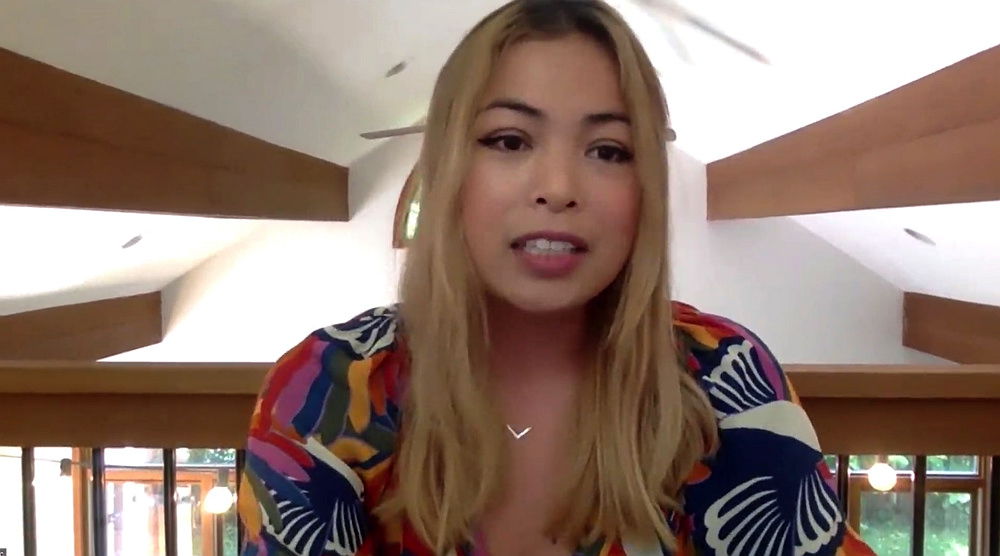
Jia Tolentino
Screenshot by Harvard Magazine
This essential grappling with uncertainty, of a new way to engage with the world and with each other—after more than a year of fear, death, chaos, protest, and social upheaval—is a process “that is incumbent upon us as people.” And as a writer, as designers, she added as a nod to her audience, we must “grasp the world as it is not to work more smoothly within it but to test its edges, to understand that it can be changed, to understand that none of this was inevitable and none of it is final; that there is always more in us, and in the people around us, than what is recognized or suggested; and that the choices we’re told matter most are often distractions from the fact that it’s the things that are not presented to us as choices that we need to understand as choices, if they’re ever to be changed.”
How do we aim for “what does not yet exist”? She contends that “it’s the work of a lifetime to remember that we should always be pushing against our known horizons.” What gets in the way is the inability to admit failures—the failure, Tolentino says, to see what abstract painter Agnes Martin once pointed out: “that feeling insufficient is ‘the natural state of mind of the artist, that sense of disappointment and defeat is the essential state of mind for creative work.’”
And then there is there is the hurdle of constant noise. The verbal static, attention-grabbing graphics, and comments that interrupt and destroy one’s capacity for unmediated thinking, reflecting, and feeling. “The sort of open-ended consciousness that many of us are coming out of the pandemic year dearly hoping to retain and to deepen—it is powerfully vulnerable to the status quo,” she said, “and the temptation of melting back into familiar categories and patterns.” Smartphones, she added, are a major obstacle to imagining what’s unknown. We “have made ourselves reachable by the imperatives of capitalism at every point in the day and any place in the world,” as the late writer Mark Fisher put it. “What better device than a [smartphone] to prevent a person from cultivating negative capability? After all, [smartphones] don’t tolerate uncertainty—they blast us with information and stimulation and various forms of the given, until all we are often left with is the existential state that is least conducive to changing or creating anything—a dull anxiety, exhaustion, and unease.”
As an antidote, as a surging pressure against this tide, she urged graduates to “pay close attention to the thoughts you have that can’t be categorized or summed up neatly. Articulate…your unformed hopes, your reactions of dissatisfaction, your instincts that are reaching for something you don’t understand quite yet. Pay attention to what you haven’t said out loud, what you fear broaching, what you yearn for most deeply, what feels too complex to see all at once or to talk about. Hone in on whatever it is in you that is straining past the boundaries of our language and our governing structures,” she urged. “Make space for that in yourself and in others—with all the sustained discomfort and confusion and conflict that it will entail.”
~Nell Porter Brown
“Be Humble”: Harvard T. H. Chan School of Public Health Convocation
In a year when public-health expertise, and those who possess it, have been in great demand, World Health Organization Director-General Tedros Adhanom Ghebreyesus had an unusual message for graduates of the Harvard T.H. Chan School of Public Health—about humility. He began with a story about a virus that started with a cook in a military camp, who complained of fever, a sore throat, aches, and pains. Within a week, 500 people were sick. Within months, the illness had become a global pandemic that eventually killed 50 million people. “As students of public health,” Ghebreyesus said, “I’m sure you know that this is no future nightmare scenario. This is what happened in the 1918 flu pandemic, more than 100 years ago.” Although it killed more people than World War I, its lessons—“that a devastating pandemic can start in any country at any time, and kill millions of people, because we are not prepared”—were quickly forgotten. He quoted Lemuel Shattuck, the “architect of American public health,” who wrote of the then-nascent field, “‘the most expensive of all things…is to do nothing.’”
Though the past 17 months have been difficult for students of public health, Ghebreyesus said, they “have also been an incredible education….You have witnessed first-hand the power of a pandemic. And you should know that it will not be the last one.”
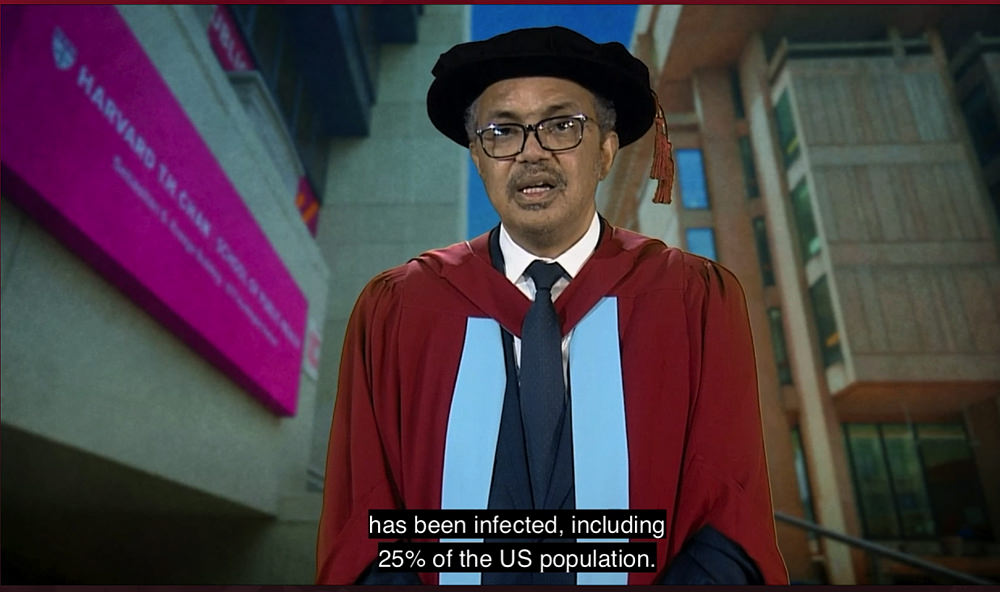
Tedros Adhanom Ghebreyesus
Screenshot by Harvard Magazine
“Certainly, there has never been so much interest in public health in my lifetime,” he continued. But this interest is atypical, and he urged the graduates not to let it distort their perspective: “It is far too common in the health world to regard others as beneficiaries of your expertise,” he warned. Be humble instead, he said, and “learn to listen,” because “the communities that you serve often have a lot more to teach you, than you do them.” Learn also to ask questions, speaking to colleagues across the disciplines. And “learn to look…” for what works in places “outside your frame of reference. You will be surprised by the adaptability of public-health efforts used in some countries to other parts of the world, or even from one neighborhood to another, or one academic discipline to another.”
Ghebreyesus’s last piece of advice to the graduates was never to be “afraid to admit when things don’t work. That, more than ever, is when you have to ask why. That is when you have to search.”
~Jonathan Shaw
Confronting a “New Normal”: Harvard Medical School Master’s Degree Ceremony
The Harvard Medical School master’s degree ceremony on Thursday afternoon, featuring a keynote address from Castle professor of medicine Dan Barouch—whose research helped develop the Johnson & Johnson vaccine against COVID-19—was definitely a celebration, but one suffused with thoughts of the past year’s engulfing global health crisis. In his opening remarks, HMS dean George Q. Daley invoked the swiftly changing “new normal” that graduates—hailing from every continent except Antarctica—have come to know. Later, Anika Singh, M.M.S. ’21, president of the Master’s Student Council, declared that “What we learned in this past year so could not have been taught to many classes before us.” Rosalind Segal, HMS dean for graduate education, noted the recent, rapid growth in the school’s graduate programs, due in part to an urgent uptick in the need for medical experts: this year, 144 students graduated; another 123 are still in the midst of their graduate studies. And, Segal said, “we already have over 220 students who will be starting new programs in the fall.” A few minutes later, before she began reading the degree candidates’ names in order to confer their degrees, she asked for a moment of silence to remember graduates’ loved ones who had died during the past year.
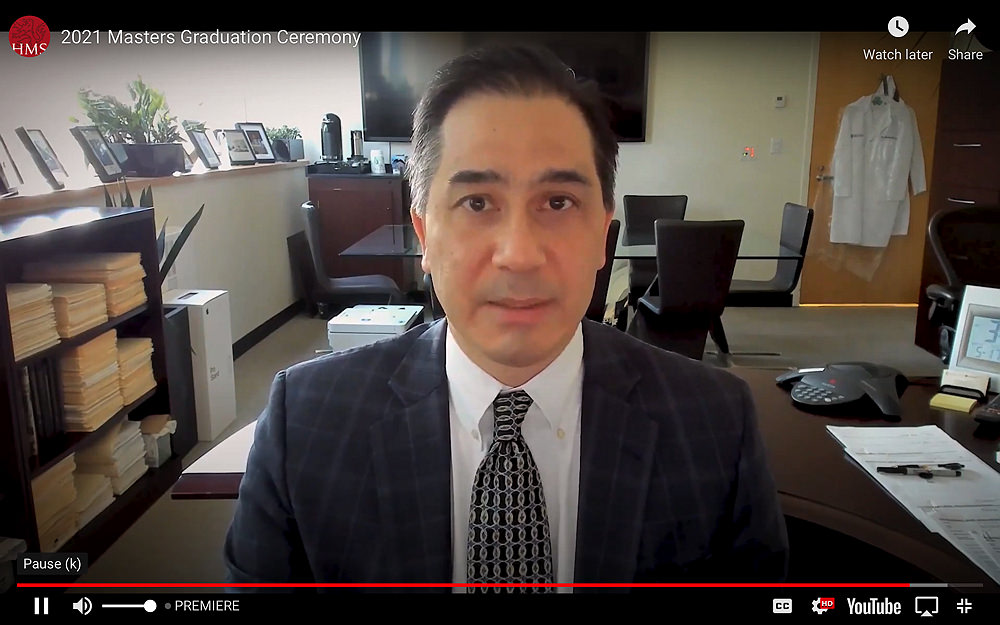
Dan Barouch
Screenshot by Harvard Magazine
In his keynote, Barouch offered an account of his experience of the past 16 months, beginning in December 2020 with reports of a mysterious pneumonia in Wuhan, China. On January 10, 2020, a Friday, the genetic sequence for SARS CoV-2 was released, and by the end of that weekend, Barouch recalled, he and other researchers had developed candidate proteins for a vaccine. By last February, they’d started to perform initial tests of vaccines on animals; human trials began in July. The Johnson & Johnson vaccine was approved the FDA for emergency use this past February. Noting the 10-day pause in its rollout this March due to rare but severe blood clots in a few patients, Barouch said that “shows the commitment to safety surveillance with all of these vaccines.”
“So, how were COVID-19 vaccines made so quickly?” he asked rhetorically. “Some people say they were rushed. I say they were made very efficiently.” Actually, though, he explained, they were not developed in just one year. “They were made over decades,” and represent long-term scientific advances in vaccine platform development and in virology and immunology. Barouch himself has spent 15 years researching a vaccine for HIV, and the technology he and his collaborators developed was put to use against COVID-19.
Barouch stressed more than once the critical importance of global vaccinations to stop the pandemic and prevent further variants from emerging. “I’m often asked the question, ‘When will the pandemic end?’ he said. “And I cannot answer that any better than anyone else. But I do feel that it’s a race between vaccination of the world and the emergence of variants that undermine vaccine control….We can’t be safe until everyone is safe,” because if the virus is surging anywhere in the world, that “leads to risks of variants everywhere in the world.”
Turning to the graduates themselves, he ended where he had begun: urging them to “tackle hard problems, because the world needs you for that.” There are plenty of people, he said, who can handle the more straightforward issues. And secondly, he said, “Try to find ways to make the world a better place, because no one is as equipped as you are to accomplish that important task.”
~Lydialyle Gibson
“Wrapped in Love”: Harvard Medical School and Harvard School of Dental Medicine Class Day
“You are graduating at an inflection point in the history of health care,” Valerie Montgomery Rice, M.D. ’87, president and dean of the Morehouse School of Medicine, told graduates of Harvard Medical School (HMS) and the Harvard School of Dental Medicine in Thursday afternoon’s Class Day address. That same sentiment echoed throughout the virtual ceremony, as nearly every speaker’s remarks were colored by the experience of the pandemic, and by the knowledge that this year’s class of doctors and dentists would be entering a changed world. Nicholas Paul DeMeo, D.M.D. ’21, said that after the past year, he and his classmates “have only grown stronger in our mission to alleviate suffering.” Alumni Relations chair A.W. Karchmer, M.D. ’64, noted how COVID-19 had brought out the best in health-care practitioners but “exposed weaknesses and some of the worst aspects of our health-care system.” And Jamaji Chilaka Nwanaji-Enwerem, M.D. ’16, Ph.D. ’18, M.P.P. ’21, spoke of a newfound awareness: “We often reflect on the vulnerability of our patients, how we serve them, offering them strength in their moments of suffering,” he said. “But during this pandemic, when stockpiles of masks and other protective equipment ran low, new light was shone on our vulnerability.”
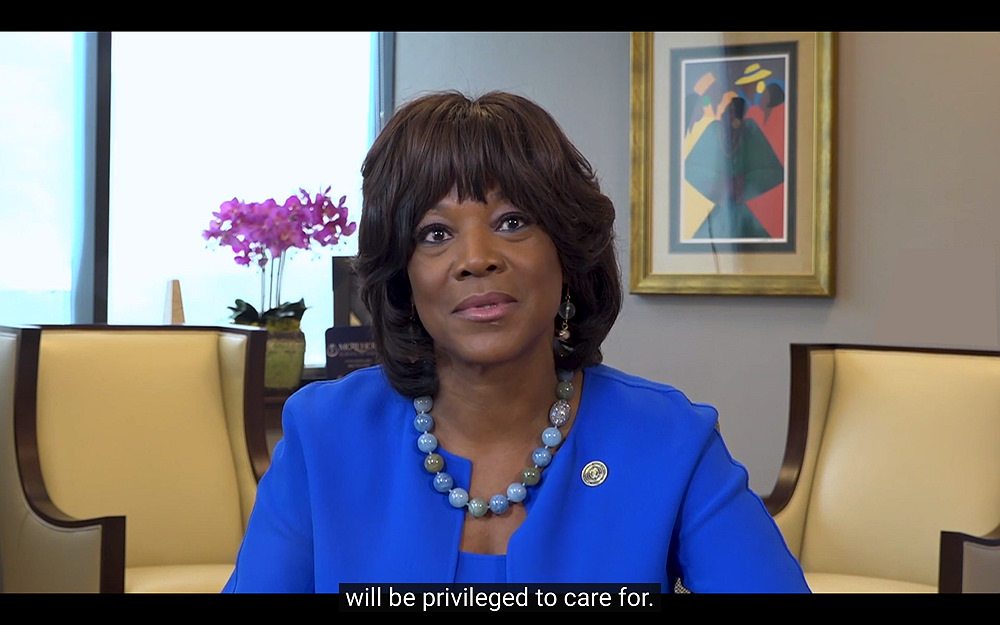
Valerie Montgomery Rice
Screenshot by Harvard Magazine
Montgomery Rice—whose daughter, Jayne Rice, M.D. ’20, graduated in the family’s living room during last year’s virtual Commencement—picked up these threads. Born and raised in Macon, Georgia, she recalled the culture shock of her arrival in Boston in the 1980s and the “small but instructive moments” at Harvard that yielded lessons about the same cultural and racial divides that were laid bare this past year, in COVID-19’s disproportionate toll on communities of color, and in the so-called “mask wars” often driven more by ideology than by science. She urged graduates to take seriously the idea of universal connection underlying public health: “COVID-19 has taught us that the health of each person not only affects the health of every person, but, literally, can bring the world to its knees. For the past year, the pandemic has shut down life as we knew it. We cannot ignore the fact that our individual survival is linked together in one humanity—no matter the color of our skin, our background, age, sexual orientation…. Every health inequity reduces the quality of life for everyone else.”
She encouraged graduates to see the whole person when interacting with patients: “If you want them to walk more, do they live in a safe neighborhood where that’s possible? If you are referring them to a specific orthodontist, do they have reliable transportation to make it to the appointment?”
Finally, Montgomery Rice said, it is important that health-care practitioners not “practice medicine in a void” but engage with the wider world. “It is easy to get lost in the science of medicine, but you have a responsibility to bring your voices to the discussion around the broader ills that impact society: racism, violence, discord. Your voice and presence matters.” Then, congratulating the graduates one last time, she added, “I ask you not to see today as just an achievement. I want you to see today as a blessing that you are going to share with those you will be privileged to care for. If you do this, then your life’s work will be wrapped in love.”
~Lydialyle Gibson
